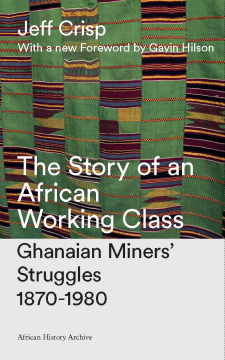
Additional Information
Book Details
Abstract
This seminal work tells the story of Ghana's gold miners, one of the oldest and most militant groups of workers in Africa. It is a story of struggle against exploitative mining companies, repressive governments and authoritarian trade union leaders.
Drawing on a wide range of original sources, including previously secret government and company records, Jeff Crisp explores the changing nature of life and work in the gold mines, from the colonial era into the 1980s, and examines the distinctive forms of political consciousness and organization which the miners developed. The study also provides a detailed account of the changing techniques of labour control employed by mining capital and the state, and shows how they failed to curb the workers' solidarity and tradition of militant resistance.
Combining lively historical narrative with original analysis, this book remains a unique contribution to the history of Africa and its working class.
‘One of the best-written and most carefully-researched studies of African labour history I have read.’
Robin Cohen, from the Preface
'One of the most vivid and important works in the history of African labour and its struggles.'
Richard Jeffries, School of Oriental and African Studies, University of London
Jeff Crisp is a research associate at the Refugee Studies Centre, University of Oxford, and an associate fellow at Chatham House. He has previously held senior positions at the Office of the United Nations High Commissioner for Refugees (UNHCR) and the Global Commission on International Migration. He is also a respected historian who has written widely on African labour history and current affairs.
Gavin Hilson is a leading global authority on the environmental and social impacts of the small-scale mining sector and has published over a hundred journal articles, book chapters and reports on the subject. He is currently professor and chair of sustainability in business at the University of Sussex.
Table of Contents
| Section Title | Page | Action | Price |
|---|---|---|---|
| Front Cover | Front cover | ||
| About the Author | iii | ||
| Title Page | v | ||
| Copyright | vi | ||
| Contents | vii | ||
| Foreword By Gavin Hilson | xi | ||
| Preface to the First Edition By Robin Cohen | xv | ||
| Acknowledgements | xix | ||
| Abbreviations | xx | ||
| MEU General Strike Poster, 1954 | xxii | ||
| AGC Anti-Strike Leaflet, 1955–56 | xxiii | ||
| Map of Ghana | xxiv | ||
| 1. A Conceptual Framework for African Labour History | 1 | ||
| Labour Control and Labour Resistance | 1 | ||
| Strategies of Control and Modes of Resistance | 3 | ||
| The Structure of Conflict in Ghana's Gold Mines | 8 | ||
| Towards a History of the African Working Class | 11 | ||
| 2. The Labour Question and the Contradictions of Control, 1870–1906 | 14 | ||
| The Origins of the Labour Question, 1810–1900 | 14 | ||
| Resistance and the Labour Question 1870–1900 | 17 | ||
| The Origins of the Labour Force, 1870–1900 | 19 | ||
| The Contradictions of Labour Control, 1900–1906 | 21 | ||
| 3. From Labour Shortage to Labour Surplus: The Recruitment and Control of a Migrant Labour Force, 1906–1930 | 35 | ||
| The Northern Territories Labour Experiment, 1906–1909 | 35 | ||
| The Chamber of Mines and the 'South African Solution', 1909–1912 | 37 | ||
| Supply and Demand in the Gold Coast Labour Market, 1912–1917 | 41 | ||
| The Post-War Labour Crisis, 1918–1920 | 43 | ||
| Coercive Recruitment in the North, 1921–1925 | 46 | ||
| Resistance, Migration, and Underdevelopment, 1925–1930 | 50 | ||
| 4. The Growth of Consciousness and the Organization of Resistance, 1930–1947 | 56 | ||
| Discontent and the Dynamics of Resistance, 1930–1937 | 56 | ||
| Responses to Resistance, 1937–1944 | 65 | ||
| Unionization and the First General Mines Strike, 1944–1947 | 76 | ||
| 5. Worker Militancy And Union Response, 1947–1956 | 94 | ||
| Mining Capital and the MHU under Pressure, 1947–1950 | 94 | ||
| Conflict in the Workplace, 1950–1954 | 104 | ||
| Union Militancy and the Second General Mines Strike, 1954–1956 | 115 | ||
| 6. Union Atrophy and worker Revolt: The CPP period, 1956–1966 | 125 | ||
| The Mine Workers' Union and the Political Economy of Independence, 1956–1960 | 125 | ||
| The MWU and the Political Economy of CPP Rule, 1961–1964 | 132 | ||
| Party Penetration and the Destruction of Union Authority, 1964–1966 | 136 | ||
| 7. Union Atrophy and worker revolt under Military and civilian regimes, 1966–1980 | 150 | ||
| The Revolt Against Authority, 1968–1971 | 150 | ||
| Reform and Revolt: Mine Worker Resistance, 1971–1980 | 165 | ||
| 8. The Limits of Militancy: Mine worker Resistance and Political Change in ghana | 179 | ||
| The Roots of Mine Worker Militancy | 179 | ||
| The Sources of Mine Worker Solidarity | 181 | ||
| Mine Worker Consciousness and its Limitations | 183 | ||
| The Mine Workers, Trade Unionism, and Political Change | 185 | ||
| Bibliography of Sources Cited | 189 | ||
| Archives | 189 | ||
| Official Publications | 190 | ||
| Periodical Publications | 191 | ||
| Secondary Sources | 191 | ||
| Interviews | 194 | ||
| Index\r | 196 |
